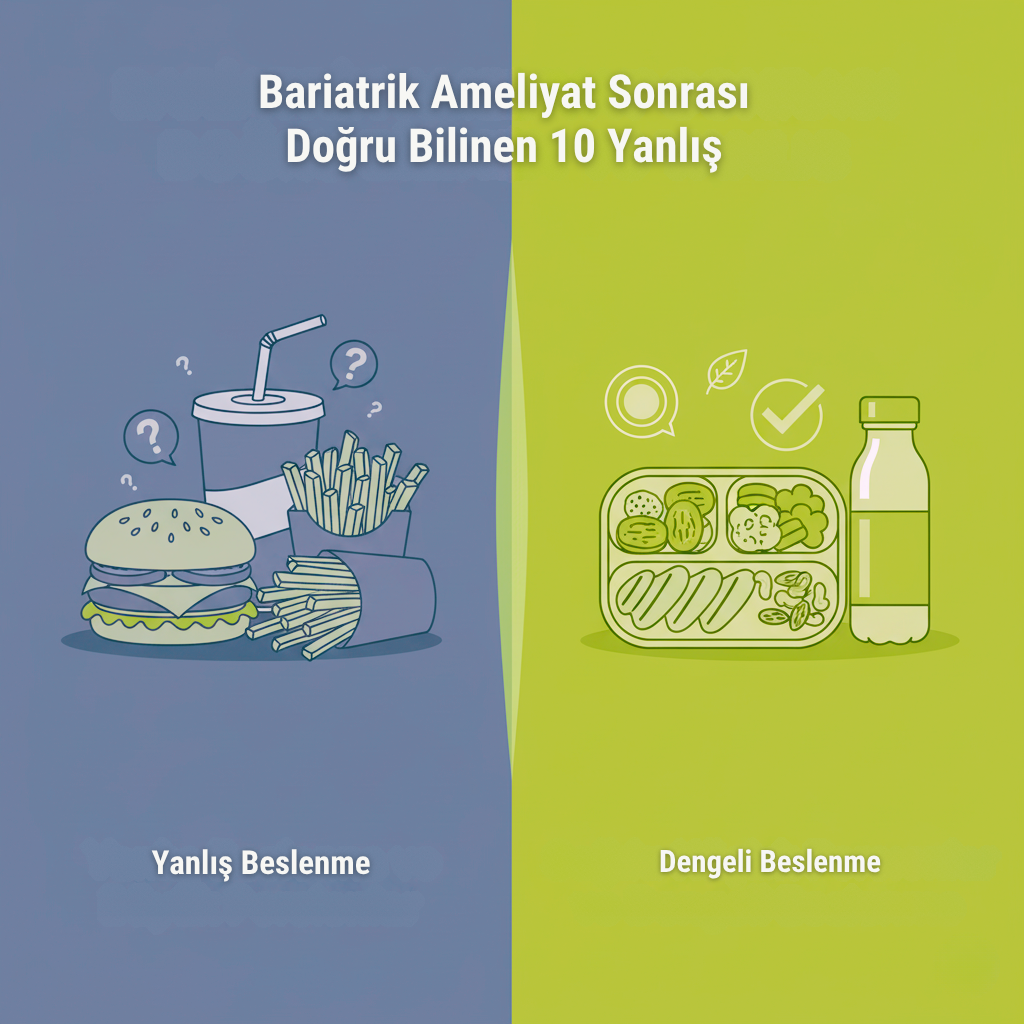
A New Beginning After Bariatric Surgery
Bariatric surgery marks a powerful new chapter in your journey against obesity. However, long-term success depends on developing mindful and sustainable eating habits after the operation. Unfortunately, misinformation and “word-of-mouth” myths can often derail even the best intentions.
Let’s uncover the 10 most common and misleading myths about post-bariatric nutrition — and replace them with science-based truths to help you stay on track.
Incorrect 1: “I’ve had gastric sleeve surgery, so I don’t need to follow a diet anymore.”
Truth: Surgery is a tool, not a magic wand. Success comes from combining this tool with healthy dietary habits. Ignoring your meal plan can lead to complications such as dumping syndrome, vitamin deficiencies, and even weight regain. Although your stomach is smaller, poor food choices can quickly undo your progress.
Incorrect 2: “Eating less will make me lose weight faster.”
Truth: Extreme restriction pushes your body into “starvation mode,” slowing your metabolism and halting weight loss (plateau effect). Instead of cutting too many calories, follow your dietitian’s balanced plan. This approach prevents muscle loss and hair thinning while promoting steady, healthy weight loss.
Incorrect 3: “Juices and sweetened coffee don’t count as calories.”
Truth: Liquid calories are silent saboteurs — they don’t create fullness but add up quickly. Your limited stomach capacity should be reserved for protein-rich, nutrient-dense foods. Sugary, carbonated, or alcoholic drinks can add hundreds of empty calories without you realizing it.
Incorrect 4: “‘Light’ or ‘Sugar-Free’ products are unlimited.”
Truth: Portion control remains essential for every food. Overeating “diet” products can trigger cravings due to artificial sweeteners and may upset your digestive system. Always read labels carefully and practice mindful portion awareness.
Incorrect 5: “The best protein source is meat only.”
Truth: Protein is crucial for maintaining muscle mass, but your options aren’t limited to meat. Lentils, chickpeas, quinoa, tofu, and eggs are also excellent sources. A balanced mix of animal and plant-based proteins supports a sustainable, well-rounded diet.
Incorrect 6: “I stopped losing weight because my body is retaining water.”
Truth: Plateaus are usually due to metabolic adaptation, not water retention. Drinking enough water actually boosts metabolism and supports fat burning. If your weight loss slows, review your food journal and increase activity instead of cutting fluids.
Incorrect 7: “Eating the same foods every day helps me lose weight faster.”
Truth: Variety prevents micronutrient (vitamin and mineral) deficiencies. Monotonous diets can cause boredom, cravings, and nutritional gaps. A diverse meal plan keeps your body nourished and your motivation high.
Incorrect 8: “Desserts are completely forbidden after surgery.”
Truth: The goal isn’t a life full of restrictions, but one based on balance. With your dietitian’s approval, enjoying a small, protein-based or healthy dessert occasionally can boost motivation. The rule isn’t “never,” but “rarely and in moderation.”
Incorrect 9: “Exercise isn’t necessary after surgery.”
Truth: Exercise is key to maintaining weight loss, preventing loose skin, and keeping metabolism active. Surgery helps you lose weight, but regular physical activity helps you stay toned, strong, and ensures the results are lasting.
Incorrect 10: “I can get all my vitamins from food alone.”
Truth: After bariatric surgery, your digestive system absorbs nutrients differently — making lifelong supplementation essential. Skipping doctor-recommended vitamins and minerals can lead to serious deficiencies and health complications.
Frequently Asked Questions (FAQ)
Q1: Is hair loss normal after gastric sleeve surgery? How can I prevent it?
A: Yes, hair loss is common during the first 3–6 months due to rapid weight loss and physiological stress. It’s usually temporary. Adequate protein intake, along with iron, zinc, and biotin supplements recommended by your doctor, can help minimize shedding.
Q2: When can I drink coffee or alcohol after surgery?
A: Decaffeinated coffee is usually allowed after the first 1–2 months, while regular coffee should be reintroduced only with your doctor’s approval. Alcohol is generally discouraged for 6–12 months due to its high calorie content and gastric irritation. Always consult your surgeon before reintroducing it.
Q3: Can weight regain happen after bariatric surgery? How can I prevent it?
A: Yes, weight regain can occur if old habits return — such as overeating, skipping exercise, or losing portion control. Prevent it by maintaining your dietary plan, staying active, and attending regular follow-ups with your healthcare team.
Q4: Why do I experience nausea or vomiting after surgery?
A: Common causes include eating too fast, not chewing thoroughly, consuming large portions, or eating foods your body can’t tolerate. Eating slowly, chewing well, and sticking to small meals can significantly reduce these symptoms.
Q5: Do I need to take vitamin supplements for life?
A: Absolutely. Especially after procedures like gastric bypass, nutrient absorption is reduced, making lifelong vitamin and mineral supplementation critical for maintaining your health.
Q6: When does weight loss slow down or stop after surgery?
A: The first 6–12 months are the most active weight loss phase. After that, it’s normal to experience slower progress or brief plateaus. Stay consistent with your plan — patience and persistence are key.
Q7: What should I pay attention to when eating out?
A: Choose grilled, baked, or steamed protein-based dishes like chicken, fish, or meatballs. Avoid fried foods, pastries, and heavy sauces. Order smaller portions, and stop eating as soon as you feel satisfied.

